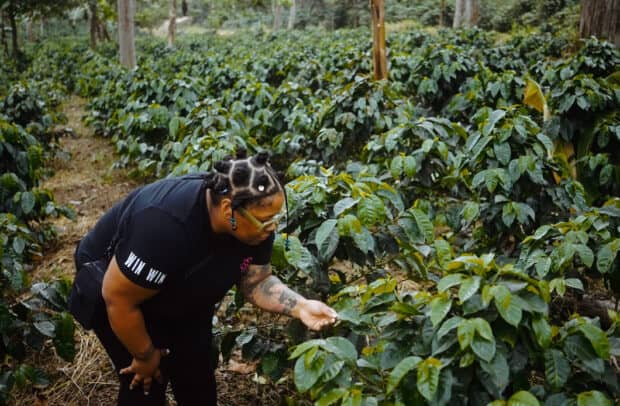ViaNexta Co-Founders Matt Nam (second from left) and Nickisha Bailey (sixth from left) at a farm visit in Colombia. All images courtesy of ViaNexta.
The founders of Philadelphia’s Win Win Coffee have launched digital supply chain platform called ViaNexta designed to connect coffee farmers in the African diaspora directly to coffee buyers.
Developed by Win Win Coffee co-founders Nikisha Bailey and Matt Nam, the digital green and roasted coffee purchasing platform aims to be faster, more convenient and less expensive for buyers, in order to help Black and brown farmers secure better prices and more stable incomes.
Currently in a pilot phase that launched in January, the platform (formerly known as CoffeePLUG) engages approximately 600 farmers, each of whom have been vetted for quality assurance. There are currently 10 buyers signed onto the platform, including roasters, distributors and retailers.
Win Win and ViaNexta Co-Founder Nikisha Bailey.
“We initially started with a smaller group of farmers and buyers to fine-tune our processes, and we have gradually scaled up to include a larger network of both,” Matt Nam told Daily Coffee News. “We leveraged our extensive network of partnerships with agricultural cooperatives, NGOs, and local governments across various countries. These relationships allowed us to engage with a large number of farmers who were eager to access better markets and more transparent trading practices.”
The pricing model for coffees sold on the ViaNexta platform is dynamic, taking into account the C-market price as a baseline reference. Platform representatives work with farmers and buyers to establish premiums for higher quality as well as sustainability certifications.
“The exact percentage above the C-market price can vary based on these factors, ensuring fair compensation for farmers,” said Nam.
ViaNexta collects a transaction fee from buyers ranging from 2-9% depending on volume. Additional revenue for ViaNexta comes through value-added services such as quality assurance, logistics coordination and financing solutions.
“There are no direct costs for farmers to join the network,” said Nam. “Our goal is to reduce barriers to market access and increase their profitability.”
Development of the platform started during the pandemic, as Bailey and Nam steered Win Win Coffee into a roasting operation following the shutdown of the brand’s brick-and-mortar cafe. Immediate challenges in sourcing quality green coffee inspired the duo to explore solutions.
Said Nikisha Bailey, “We were met with so many challenges and knew that there had to be a better way to streamline the supply chain and take better care of the producer on the other side.”
Nam, a grandchild of Jamaican farmers whose work prior to Win Win was developing software for medical and healthcare applications, began working with agriculture scientists and engineers from Ghana and the University of Pennsylvania.
Together they built a platform for importers, roasters, cafes, or anyone committing to bulk purchases of green or roasted coffee in regular intervals. Price negotiations occur online, and are aided by proprietary AI-assisted algorithms that monitor commodities prices in real time, manage risk scores and contribute to yield prediction.
Through direct communications, producers and buyers can share images, names and other details for traceability, marketing or their own relationships. The platform uses PayPal to facilitate payments to farmers local currency.
“A significant portion of Win Win’s coffee is now sourced through ViaNexta,” said Bailey. “This allows us to maintain transparency and traceability while supporting the farmers in our network.”
The founders told DCN that the ViaNexta pilot will continue to expand to additional regions, as well as to additional commodities, based on its success in coffee. More advanced technologies will also continue to be incorporated, such as AI-driven analytics and blockchain for enhanced traceability. A phased transition of the program from pilot to full launch is projected for early 2025.
Comments? Questions? News to share? Contact DCN’s editors here.
Related Posts
Howard Bryman Howard Bryman is the associate editor of Daily Coffee News by Roast Magazine. He is based in Portland, Oregon.


